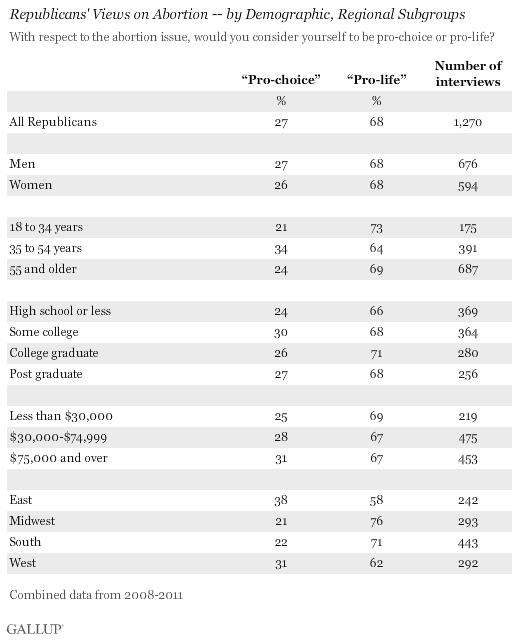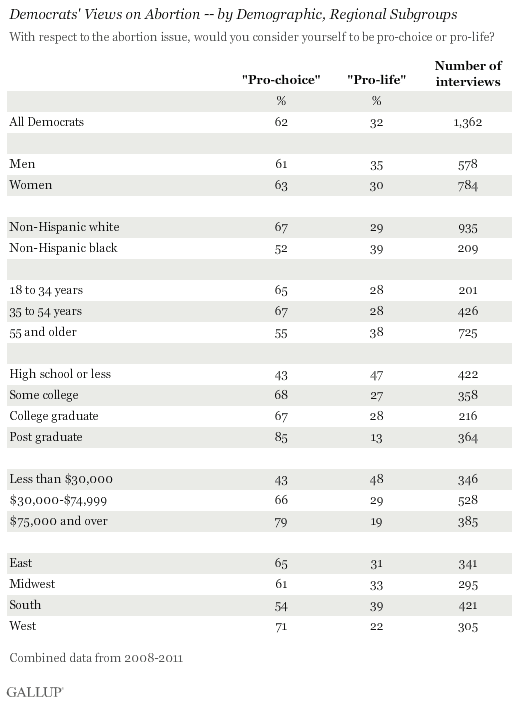PRINCETON, NJ -- As the 2012 Republican presidential contenders begin to hone their campaign messages and court social-issues voters, a Gallup analysis reveals the striking homogeneity of rank-and-file Republicans on abortion. Roughly two-thirds of Republicans across most major gender, age, educational, and income lines describe themselves as "pro-life," while about a quarter call themselves "pro-choice."

Republicans' abortion views show slightly greater variability by region of the country. Those living in the East and West are less unified around the pro-life label than those in the South or Midwest, although even on the coasts, it is the majority view.
These findings are based on an aggregation of Gallup's annual Values and Beliefs surveys from 2008 through 2011, encompassing 1,270 Republicans.
Class Differences in Democrats' Abortion Views
Republicans' broad unity on abortion contrasts with Democrats' more variable support for the pro-choice label. According to interviews with 1,362 Democrats since 2008 as part of Gallup's Values and Beliefs surveys, differences in Democrats' views on the issue are particularly seen along socio-economic lines.
Whereas Democrats with a high school education or less tilt pro-life by 47% to 43%, the pro-choice view rises to 68% among those with at least some college education and to 85% among those with postgraduate education. Similarly, adherence to the pro-choice label among Democrats rises from 43% in the lowest income group to 79% in the highest one.
Like Republicans' abortion views, Democrats' views also vary somewhat by region, with Democrats in the West being the most unified around the pro-choice position, and those in the South, the least. Also similar to Republicans, Democrats exhibit no gender gap on abortion. There is a modest generational gap, with Democrats 55 and older being slightly less likely than younger Democrats to describe themselves as pro-choice.
Black Democrats are slightly less likely than white Democrats to be pro-choice, although the majority of both groups take the pro-abortion-rights position. The 2008-2011 Gallup dataset contains too few black Republicans for a comparable look at racial views on abortion within that party.

Religion a Factor in Abortion Views in Both Parties
Abortion views are closely intertwined with religion, and that is seen within both parties just as it is among the public at large. The percentage of Republicans who are pro-life is 38 points higher among those who seldom or never attend church or another place of worship compared with those who attend weekly, 46% vs. 84%. A nearly identical gap in pro-choice support is seen among Democrats between non-churchgoers and regular attendees, 77% vs. 40%.

Bottom Line
Consistent with the solid "pro-life" stance of rank-and-file Republicans, the emerging Republican presidential field is dominated by anti-abortion candidates and potential candidates, with all of the current top-tier names (at 5% or better in Gallup polling) embracing the pro-life label. This includes Mitt Romney, Sarah Palin, Ron Paul, Newt Gingrich, Herman Cain, Tim Pawlenty, and Michele Bachmann. The primary differences among them on the issue generally have to do with whether they oppose all abortions or would make an exception for rape and incest.
Such unity would normally suggest that the Republican nomination will be decided on something other than abortion. That would seem particularly true this year with the economy and federal budget deficit eclipsing other concerns in voters' minds. However, Romney's candidacy could change that if his competitors decide to make his past positions in support of abortion rights an issue. The Gallup analysis of Republicans' abortion views suggests that such criticism of Romney could be broadly communicated to GOP voters in a way that might not work for abortion messaging in the Democratic Party. It would matter little if Romney's GOP opponents make their case at a $1,000-a-plate dinner in Ohio, a down-home picnic in New Hampshire, or to college Republicans -- the audience would likely be sympathetic to a pro-life message. Whether Republicans would care enough to prioritize questions about Romney's sincerity on abortion over other issues remains a different matter.
Survey Methods
Results are based on telephone interviews conducted as part of four separate Gallup polls conducted between 2008 and 2011, with a random sample of 4,079 national adults, aged 18 and older. Survey dates for the four polls are May 5-8, 2011; May 3-6, 2010; May 7-10, 2009; and May 8-11, 2008.
For results based on the total sample of 1,270 Republicans, one can say with 95% confidence that the maximum margin of sampling error is ±3 percentage points. For results based on the total sample of 1,362 Democrats, one can say with 95% confidence that the maximum margin of sampling error is ±3 percentage points.
Interviews across the four surveys were conducted with respondents on both land-line telephones and cellular phones, although the precise methods and minimum quotas used for each survey differ according to changes over time in cell-phone use and penetration. The 2011 survey included interviews conducted in Spanish for respondents who are primarily Spanish-speaking.
Samples are weighted by gender, age, race, Hispanic ethnicity, education, region, adults in the household, and phone status. Demographic weighting targets for each survey are based on the most recent Current Population Survey figures for the aged 18 and older non-institutionalized population living in U.S. telephone households. All reported margins of sampling error include the computed design effects for weighting and sample design.
In addition to sampling error, question wording and practical difficulties in conducting surveys can introduce error or bias into the findings of public opinion polls.
For more details on Gallup's polling methodology, visit www.gallup.com.
